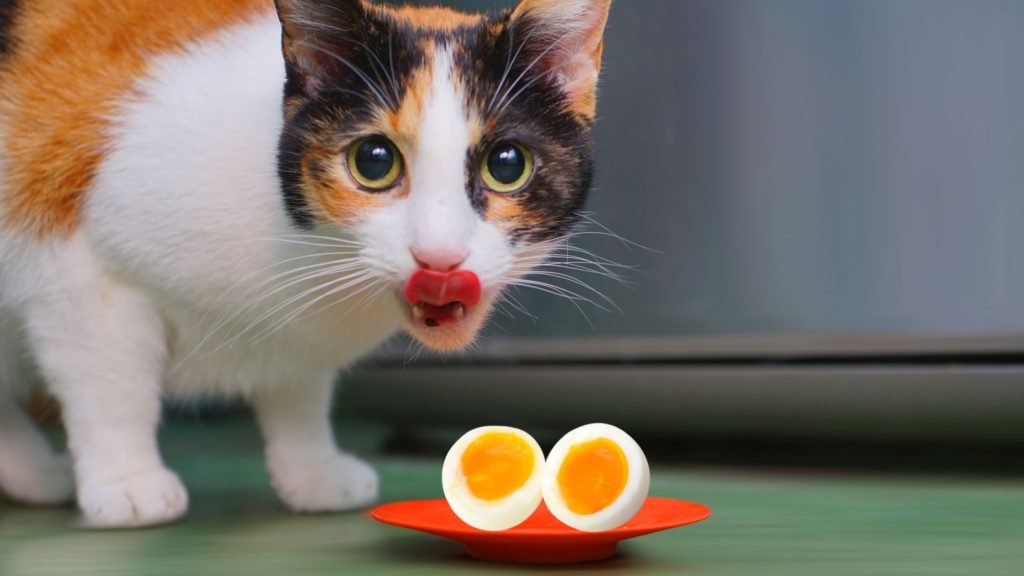Get the scoop on ‘Are Eggs Good for Cats?’ and discover if this popular human food is safe and nutritious for your feline family.
Imagine your cat watching you intently as you crack open an egg. Is it safe to share this food with your furry friend? Read on to learn the truth about feeding eggs to cats and how it relates to their overall nutrition.
The Role of Eggs in a Cat's Diet
Cats are obligate carnivores, requiring a diet rich in animal-based protein. Eggs, a good protein source, seem like a suitable option. Let’s dive deeper into the benefits and potential concerns of feeding eggs to cats.
The Nutritional Value of Eggs
Essential elements, including protein, vitamins, and minerals, may all be found in eggs. However, cats have specific dietary requirements that differ from humans.
A. Protein Content: Cats need a high-protein diet, and eggs are an excellent source of protein. The amino acids in eggs are highly bioavailable, making them easily digestible for cats.
B. Vitamins and Minerals: Eggs are rich in vitamins and minerals, including vitamins A and B, and minerals such as iron and selenium. These nutrients are crucial for maintaining your cat’s overall health.
Raw Eggs vs. Cooked Eggs
Before you add eggs to your cat’s menu, it’s essential to understand the differences between raw and cooked eggs and how each affects feline nutrition.
A. Raw Eggs: Feeding raw eggs to cats carries the risk of bacterial infections, such as Salmonella or E. coli. Additionally, raw egg whites contain a protein called avidin, which can interfere with the absorption of biotin, a B vitamin essential for healthy skin and coat.
B. Cooked Eggs: Cooking eggs eliminates the risk of bacterial contamination and neutralizes avidin. However, cooking eggs without added fats, salt, or spices is essential, which can harm cats.
Healthiest Cat Breeds and the Role of Nutrition
While the primary keyword “healthiest cat breeds” may not be directly related to eggs, it’s crucial to understand that proper nutrition plays a significant role in a cat’s overall health, regardless of breed. Choosing the appropriate diet for your cat, including considering the benefits and drawbacks of feeding eggs, can contribute to their well-being and longevity.
Potential Concerns of Feeding Eggs to Cats
While eggs can be a nutritious addition to a cat’s diet, there are some potential concerns that cat owners should be aware of.
A. Allergies: Some cats may be allergic to eggs, resulting in symptoms such as itching, vomiting, or diarrhea. If you suspect your cat has an egg allergy, consult your veterinarian.
B. Weight Gain: Overfeeding any food, including eggs, can lead to weight gain. Obesity can cause various health issues in cats, so monitoring your cat’s weight and adjusting its diet is essential.
C. Unbalanced Diet: Feeding too many eggs can lead to an unbalanced diet, lacking essential nutrients that cats require for optimal health. Eggs are occasionally acceptable as a special treat but shouldn’t be a regular part of their diet.
How to Safely Include Eggs in Your Cat's Diet
If you give eggs to your cat, follow these guidelines to ensure their safety and well-being.
A. Start Slow: Introduce eggs gradually into your cat’s diet to avoid upsetting its stomach.
B. Cook the Eggs: Serve cooked eggs without added fats, salt, or spices.
C. Monitor for Allergies: Watch for signs of an allergic reaction and consult your veterinarian if you suspect an issue.
D. Moderation is Key: Feed eggs as an occasional treat, not a primary food source.
Alternatives to Eggs for Cat Nutrition
If you’re looking for other protein-rich options to supplement your cat’s diet, consider these alternatives:
A. Lean Meats: Cats thrive on animal-based protein, so offering lean meats like chicken or turkey is a great option. Ensure the meat is cooked thoroughly and free of added salt, seasonings, or sauces.
B. Fish: Fish is another protein-rich cat food, providing essential omega-3 fatty acids that promote healthy skin and coat. Offer cooked fish occasionally, as some types of fish can contain heavy metals or toxins that may be harmful if consumed in large amounts.
C. Commercial Cat Food: High-quality commercial cat food provides protein, vitamins, and minerals. Look for brands with whole meats or meat meals as the primary ingredient.
Consult Your Veterinarian for Personalized Nutrition Advice
Every cat has unique nutritional requirements based on age, breed, activity level, and overall health. To ensure your cat receives the best nutrition, consult your veterinarian for personalized advice tailored to their needs.
Regular Check-ups and Monitoring
Schedule regular check-ups with your veterinarian to monitor your cat’s health and make any necessary adjustments to its diet. This proactive approach will help ensure your cat remains healthy and happy.
Conclusion: Are Eggs Good for Cats?
Eggs can be a nutritious addition to your cat’s diet when offered in moderation and cooked correctly. However, it’s essential to consider your cat’s specific nutritional needs and any potential risks associated with feeding eggs. Please consult with your veterinarian for personalized guidance on your cat’s diet. Remember that a balanced and varied diet is vital to supporting their health and well-being. You can enjoy a delicious treat with your feline friend while promoting their long-lasting health with the right approach.

